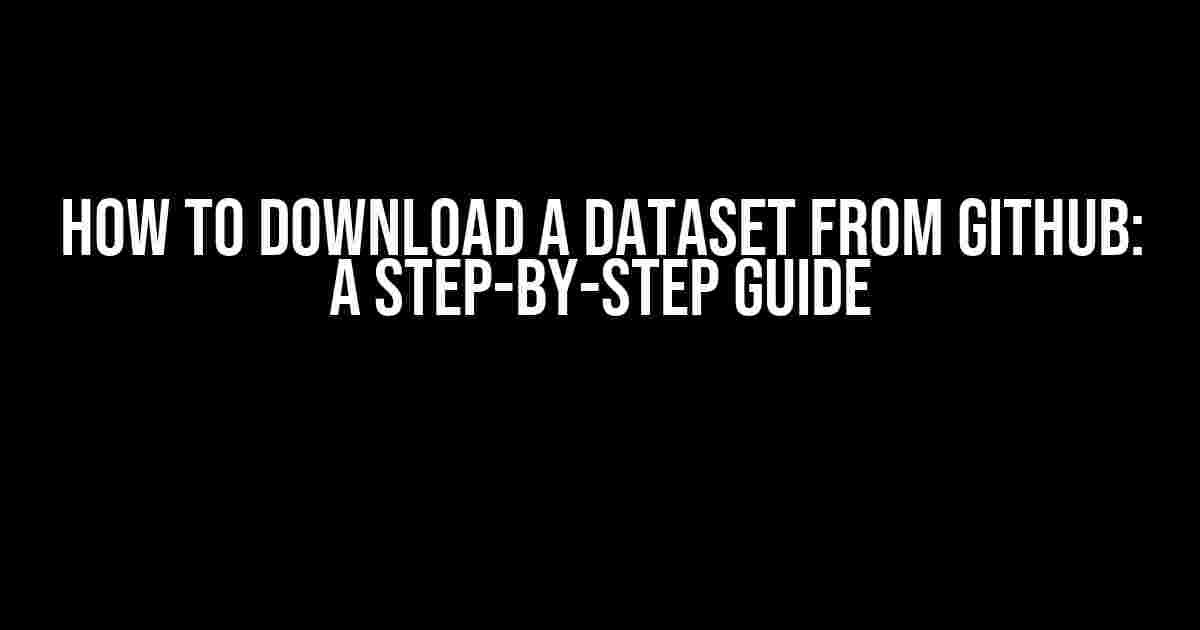Are you tired of scouring the internet for datasets to use in your projects? Look no further! Github is an excellent resource for finding and downloading datasets, and in this article, we’ll show you exactly how to do it. With these easy-to-follow instructions, you’ll be downloading datasets like a pro in no time!
What is Github?
Github is a web-based platform for version control and collaboration on software development projects. But did you know that it’s also a treasure trove of datasets? Many developers, researchers, and organizations share their datasets on Github, making it a valuable resource for anyone looking to work with data.
Why Download Datasets from Github?
There are several reasons why you might want to download datasets from Github:
- Convenience**: Github datasets are often carefully curated and cleaned, saving you time and effort.
- Reusability**: Many datasets are reusable, saving you the trouble of collecting and processing your own data.
- Community-driven**: Github datasets are often contributed by the community, making them a great way to leverage collective knowledge and expertise.
- Variety**: Github hosts a vast array of datasets, covering everything from climate data to social media data.
Step 1: Find a Dataset on Github
Before you can download a dataset, you need to find one! Here’s how:
github.comand sign in to your account (or create one if you don’t already have one).- Click on the
Exploretab at the top of the page. - Type in a keyword related to the dataset you’re looking for (e.g. “climate data”, “social media data”, etc.) in the search bar.
- Browse through the search results to find a dataset that interests you.
Dataset Repositories vs. Individual Files
On Github, datasets can be stored in two ways:
- Dataset repositories**: These are dedicated repositories containing a collection of files related to a specific dataset. They often include documentation, code, and data files.
- Individual files**: Some datasets are stored as individual files, which can be downloaded directly from the search results page.
Step 2: Download the Dataset
Once you’ve found a dataset, it’s time to download it! Here’s how:
Downloading a Dataset Repository
For dataset repositories, you’ll need to:
- Click on the repository name to open it.
- Click on the
Codebutton on the right-hand side of the page. - Click on
Download ZIPto download the entire repository as a ZIP file.
Downloading Individual Files
For individual files, you can download them directly from the search results page:
- Click on the file name to open it.
- Click on the
Rawbutton on the top-right corner of the file viewer. - Right-click on the
Rawbutton and selectSave asto download the file.
Step 3: Extract and Explore the Dataset
Once you’ve downloaded the dataset, it’s time to extract and explore it:
Extracting the Dataset
If you downloaded a ZIP file, you’ll need to extract it using a tool like WinRAR or 7-Zip:
$ unzip dataset.zip
Exploring the Dataset
Now that you’ve extracted the dataset, you can explore it using your favorite tools and programming languages:
$ cd dataset $ ls
This will list the files and directories in the dataset. You can then use tools like `head` and `tail` to preview the data:
$ head data.csv $ tail data.csv
Tips and Variations
Here are some additional tips and variations to keep in mind:
- Data format**: Github datasets can come in a variety of formats, including CSV, JSON, and Excel. Make sure you have the necessary tools to work with the dataset.
- Licensing**: Be sure to check the licensing terms for the dataset. Some datasets may have restrictions on use or redistribution.
- Dataset updates**: If you’re working with a dataset that’s regularly updated, be sure to check for new versions regularly.
Conclusion
Downloading datasets from Github is a great way to access high-quality data for your projects. By following these steps, you’ll be able to find and download datasets with ease. Remember to always check the licensing terms and explore the dataset before getting started.
Happy downloading!
| Dataset Type | Example |
|---|---|
| Climate data | temperature, precipitation, sea level |
| Social media data | Twitter, Facebook, Instagram |
| Financial data | stock prices, exchange rates, commodity prices |
Some popular datasets on Github include:
We hope you found this article helpful! If you have any questions or need further assistance, feel free to ask in the comments below.
Frequently Asked Question
Got stuck while downloading a dataset from Github? No worries! We’ve got you covered. Here are some frequently asked questions to help you out.
Q1: How do I download a dataset from Github?
Easy peasy! Just click on the ‘Code’ button on the dataset’s Github repository page, then click on ‘Download ZIP’. This will download the entire repository as a ZIP file, including the dataset.
Q2: What if the dataset is too large to download as a ZIP file?
No problem! In that case, you can use Github’s ‘ Releases’ feature to download the dataset. Look for the ‘Releases’ tab on the repository page, then click on the ‘Assets’ dropdown to find the dataset file. You can also use command-line tools like `wget` or `curl` to download the file directly.
Q3: Can I download a specific file from the dataset instead of the whole repository?
Absolutely! You can download a specific file from the dataset by clicking on the file in the repository, then clicking on the ‘Raw’ button. This will take you to a raw view of the file, where you can right-click and ‘Save as’ to download it.
Q4: How do I download a dataset from a private Github repository?
Got access to a private repository? You can download a dataset from a private repository by using a personal access token. Generate a token on your Github settings page, then use it to authenticate with the repository using the command line or a tool like `git clone`.
Q5: What if I’m having trouble accessing a dataset due to repository permissions?
Oops, permission problems! If you’re having trouble accessing a dataset due to repository permissions, try reaching out to the repository owner or maintainer to request access. Alternatively, you can also look for alternative sources of the dataset or ask your instructor for assistance.



